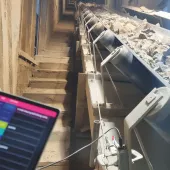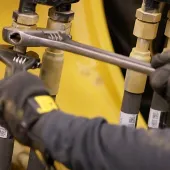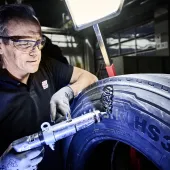Pumps problems: Repair or replace?
Tsurumi Pump’s Kevin Boicken provides key insights to help operators choose the right solution
PUMPS play an essential role in many industrial processes, significantly impacting operational efficiency. Determining when to repair or replace a pump is key to reducing downtime and managing costs effectively. A common rule is that if repair costs surpass 50% of a new pump’s price, replacement is usually the better option. Factors such as motors, bearings, and electrical systems often drive these decisions, as major components are involved.
Another important aspect in deciding whether to repair or replace is evaluating the pump’s performance. If the pump still meets operational standards – such as flow rate and pressure – minor repairs, like replacing the impeller or wear plate, may suffice. These repairs typically fall below the 50% cost threshold, making repair the preferred option. On the other hand, if the pump struggles to maintain its performance or experiences significant failures, such as motor burnout or mechanical breakdown, replacement may be necessary.
While pump age alone is not typically a decisive factor, it can be relevant in certain situations. For instance, if a pump has been operating for 15–20 years, especially in challenging environments such as handling abrasive materials (eg sand or rocky soil), wear on critical components may justify replacement. A pump that has operated efficiently for more than a decade may be better off being replaced to prevent recurring issues, even if repair costs are less than 50% than those of a new pump.
In some cases pump failure can result from incorrect application or improper use rather than mechanical issues. It is essential to ensure that the pump is suitable for its intended application. For instance, a pump designed for clean water should not be used in environments with abrasive materials or heavy solids. Misapplication can lead to premature failures that could have been avoided with the right pump choice. If failure is due to incorrect application, a replacement that better fits the operational demands might be worth considering.
When evaluating pump repairs, it’s crucial to consider their potential impact on operations. Extended downtime can disrupt production schedules, making replacement a more feasible option if repairs take too long. Having a backup pump available, especially for critical applications, can help minimize the risk of operational setbacks.
Tsurumi pumps come with a two-year warranty and have failure rates well below industry standards, highlighting their reliability. This level of durability means that Tsurumi pumps rarely require warranty repairs. To maintain performance, customers should follow the recommended maintenance schedule, including regular oil inspections and bearing lubrication. Unfortunately, many users overlook this, operating their pumps until catastrophic failures occur, complicating the repair versus replacement decision.
Unlike some manufacturers, Tsurumi offers consistent pump models, making it easier to find replacement parts for older models. This simplifies the repair process for older pumps, as accessible and reasonably priced parts can make repair a more appealing option – even for pumps that have been in use for decades.
The size and budget of a business may also influence the decision to repair or replace a pump. Larger businesses might be more inclined to repair pumps despite cost, as they often have more flexibility with capital expenditures. In contrast, smaller customers typically prefer replacement options, prioritizing long-term savings.
Ultimately, the decision to repair or replace a pump depends on the cost, performance, and specific application. Regular maintenance, a clear understanding of the application, and using the proper pump for the intended task can extend a pump’s lifespan and mitigate the need for early replacements. Reliable manufacturers such as Tsurumi Pump, recognized for their low failure rates and parts availability, provide assurance and operational stability to simplify these decisions.










